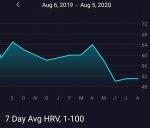Abrin
Senior Member
- Messages
- 329
Okay, I have to admit that I am completely confused by some of the heart rate variability data that I've been collecting over the last couple of years and I was hoping that maybe someone else could explain what has been happening to me.
So, as far as my limited understanding goes it is supposed to be that your heart rate variability if trending downwards that is supposed to be a bad sign because it means your body is sick or fatigued but if it is trending upwards it is a sign of fitness.
So, this is where things get really strange. In the last two years as I have been becoming 'healthier' and have been able to move more in my daily life my heart rate variability has essentially free-falling and dropping lower than it ever has been before which according to the definition of how heart-rate variability works is the complete opposite of what is suppose to be going on while I am getting 'healthier'.
Anyway, I was hoping someone had some theories about why this is happening because I am at a complete loss.
So, as far as my limited understanding goes it is supposed to be that your heart rate variability if trending downwards that is supposed to be a bad sign because it means your body is sick or fatigued but if it is trending upwards it is a sign of fitness.
So, this is where things get really strange. In the last two years as I have been becoming 'healthier' and have been able to move more in my daily life my heart rate variability has essentially free-falling and dropping lower than it ever has been before which according to the definition of how heart-rate variability works is the complete opposite of what is suppose to be going on while I am getting 'healthier'.
Anyway, I was hoping someone had some theories about why this is happening because I am at a complete loss.

